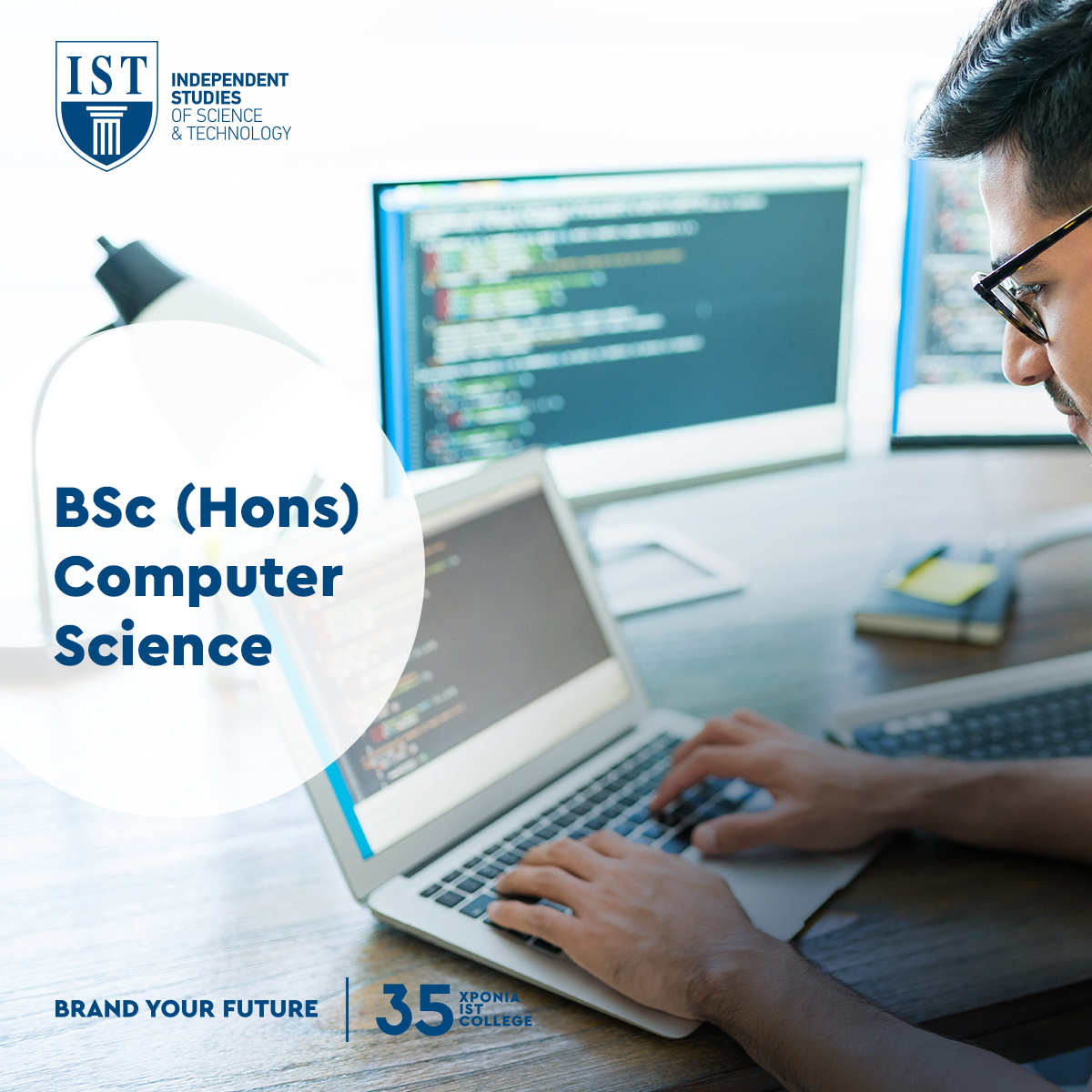
Duration
Full time-3 years
Μοde of Delivery
On site, Online
Language of Delivery
Greek, English
Start Date
October 2026
Location
Athens, Greece



Description
The BSc (Hons) Computer Science programme is a three-year undergraduate study programme that provides the appropriate theoretical and practical background to develop technical skills related to the design, development and management of computer systems.
You will develop abilities to choose appropriate tools and techniques for the analysis, design and development of each system, you will acquire capabilities to evaluate the best practices in software development management. You will understand the effects that information systems have on organizations as a whole but also on the people who make them up, you will delve into the variety and differentiation of business information systems and how they are used. You will understand the principles of operation of a wide variety of different technologies that use networks and gain knowledge in the technical aspects of security of information systems, with a particular emphasis on preventing malicious users (hackers) from gaining access to them.
The programme is offered in partnership with Wrexham University
Objectives of the Programme
- Because you will gain a strong knowledge base in the fundamentals of computing, including programming languages, Web Development, the philosophy of algorithms, databases, computer architecture and operating systems.
- Because you will develop programming, data management, Software Skills to understand and develop solutions for today’s computer-dominated world.
- Because you will understand the principles that govern computing systems, including networks, operating systems and computer architecture.
- Why IT specialists are in high demand as technology now plays a role in almost everything we do. Our degree in Computer Science combines the fundamentals of the field with an approach to adopting and promoting all new developments.
- Because you will develop practical skills useful in every area of business, such as problem solving, teamwork, project management.
Structure of the Study Programme
Course Description
The aim of this course is to introduce students to the fundamental principles and techniques of Machine Learning. Emphasis is placed on understanding supervised and unsupervised learning algorithms such as Linear Models, Decision Trees, Random Forests, Neural Networks, and Deep Learning, as well as on the study of Evaluation Metrics, Data Pre-processing, Image/Speech Recognition, Natural Language Processing, and issues of Ethics and Bias.
Educational Objectives
After completing the course you will be able to:
-
Identify and explain the key concepts and techniques of Machine Learning
-
Apply Machine Learning algorithms to real-world problems
-
Evaluate the performance of different models using appropriate metrics
-
Recognise ethical issues and bias in Machine Learning applications
Course Description
This course focuses on the principles of information protection and governance within organisations. Topics include risk management, security operations, incident response, identity and access management, legal and regulatory compliance, as well as security governance and emerging technologies. Particular emphasis is given to professional and ethical approaches, including social, political, and sustainability dimensions.
Educational Objectives
After completing the course you will be able to:
-
Apply compliance laws, regulations, and standards in real-world environments
-
Assess and implement information security standards in both the private and public sectors
-
Recognise international laws and regulations related to information security
-
Interpret professional certifications in the field of computing
Course Description
This course introduces the fundamental principles of programming through an industry-standard programming language and the use of an Integrated Development Environment (IDE). It covers essential concepts such as conditionals and loops, arrays and sorting, methods and functions, objects and instances, data structures, as well as an introduction to source control and basic graphics.
Educational Objectives
After completing the course you will be able to:
-
Identify the syntax and structure of a programming language
-
Apply programming techniques to contextualized problems
-
Develop solutions in an IDE using appropriate logic and structures
-
Demonstrate understanding of basic data structures and source control
Course Description
This course provides a foundational understanding of computer systems and their architecture. Topics include components such as CPU, memory, I/O, and storage, as well as concepts such as instruction sets, memory hierarchy, bus structures, pipelining, and parallelism. Students also develop skills in performance evaluation and gain practical experience in assembling, configuring, and troubleshooting systems.
Educational Objectives
After completing the course you will be able to:
-
Identify and describe the core components of a computer system
-
Explain concepts of computer organization and architecture
-
Evaluate system performance using performance metrics
-
Demonstrate practical skills in assembling, configuring, and troubleshooting
Course Description
The aim of this course is to equip students with knowledge and skills in designing and implementing efficient database schemas using SQL, with an emphasis on ensuring data integrity. In addition, the course covers SQL techniques for queries, data manipulation, and the management of data from multiple tables, enabling students to apply comprehensive solutions to real-world scenarios.
Educational Objectives
After completing the course you will be able to:
-
Design and implement normalised database schemas using SQL
-
Apply SQL techniques for queries across multiple tables
-
Demonstrate proficiency in managing, retrieving, and manipulating data in databases
Course Description
The aim of this course is to introduce fundamental computational and mathematical concepts required for applications in Computer Science, Software Engineering, and Cyber Security. Teaching focuses on linking mathematical theories and techniques with real-world scenarios, making use of industry-standard tools, hardware, and software. Students develop problem-solving skills through coursework that reflects the needs of the digital industries.
Educational Objectives
After completing the course you will be able to:
-
Identify mathematical problems in computing-related scenarios
-
Apply computational techniques to solve technical problems
-
Use software packages to provide mathematical solutions relevant to the field of study
Course Description
This course introduces the fundamental principles of programming through an industry-standard programming language and the use of an Integrated Development Environment (IDE). It covers essential concepts such as conditionals and loops, arrays and sorting, methods and functions, objects and instances, data structures, as well as an introduction to source control and basic graphics.
Educational Objectives
After completing the course you will be able to:
-
Identify the syntax and structure of a programming language
-
Apply programming techniques to contextualized problems
-
Develop solutions in an IDE using appropriate logic and structures
-
Demonstrate understanding of basic data structures and source control
Course Description
This course provides a foundational understanding of computer systems and their architecture. Topics include components such as CPU, memory, I/O, and storage, as well as concepts such as instruction sets, memory hierarchy, bus structures, pipelining, and parallelism. Students also develop skills in performance evaluation and gain practical experience in assembling, configuring, and troubleshooting systems.
Educational Objectives
After completing the course you will be able to:
-
Identify and describe the core components of a computer system
-
Explain concepts of computer organization and architecture
-
Evaluate system performance using performance metrics
-
Demonstrate practical skills in assembling, configuring, and troubleshooting
Course Description
The course is designed to enable you to become a well-rounded and responsible professional. You will learn to identify and address design, security and usability issues in the development and operation of computer systems. You will be able to relate theory to practice and identify ethical, sustainable, legal and environmental constraints in the IT industry.
Educational Objectives
After completing the course you will be able to:
- Demonstrate professionalism in following HR codes and IT industry guidelines
- Identify, analyze and discuss the effects of technological change on society as well as the ethical, legal and environmental constraints
- Assess the impact of the legal framework on the design of computer systems and software
Course Description
This course examines the usability aspects of user interfaces and will enable you to analyze, design and evaluate existing systems on a range of modern devices. You will also study the impact this technology has on wider social, ethical, legal, political, economic and environmental issues. This will enable you to build systems for emerging interactive products such as robotics, wearables, wearables and smart home products that incorporate aspects of learning, accessibility, usability, utility and aesthetics.
Educational Objectives
After completing the course you will be able to:
- Work either individually or in a team to design solutions to current IT issues, taking into account the wider social, ethical, legal, political, economic and environmental implications
- Explain the need for good practice in UXD, from the perspectives of computational and cognitive psychology
- Choose appropriate communication styles, perform user modeling, task analysis and user interface design in the context of UXD
- Use a range of methods to evaluate user experience, including quantitative and qualitative methods
Course Description
This course provides a thorough knowledge of the theories and application of basic computer programming concepts such as algorithms, abstract data types, underlying data structures and their integration to produce efficient code. In this way it will enable you to develop the necessary knowledge and skills to be able to analyze problems and then design, implement and analyze effective algorithmic solutions using the appropriate programming language.
Upon completion of the course, you will be familiar with the implications of algorithmic solutions in terms of their computational complexity (space, time and logic) while at the same time, you will develop a working knowledge of optimal and approximate solutions to problems that will be developed using object-oriented methodologies with modern programming techniques.
Educational Objectives
After completing the course you will be able to:
- Identify and evaluate problems and solutions in terms of their computational complexity
- Apply computational solutions that demonstrate their cognitive proficiency across a range of data structures, algorithms, and object-oriented programming techniques
- Write, compile, run, test, and debug object-oriented programs
Course Description
His participation in the preparation of the Group Work will provide you with essential practical experience in dealing with the tasks, issues and situations that you may face in a digital project that you will undertake as a member of a work group. Through this way of working-collaboration you will have the possibility, combining theoretical and practical knowledge, to organize, communicate and coordinate effectively the tasks that focus on the practical details of the design, development and implementation of a digital product.
Educational Objectives
- Work as part of a team to design, develop, test and implement a digital product
- Identify, implement and monitor with appropriate methodologies the development of a project, through teamwork
- Evaluate technical and professional management issues related to development projects and supported by teams
- Identify and apply legal, ethical and professional issues appropriate to both current and future professional digital development environments
Course Description
This course examines the basic concepts of software design and development on web platforms in closed and open source systems. It covers technical aspects of the analysis, design and implementation of databases and online information systems. In addition, it provides all the conceptual and practical understanding of web design and development and encourages the integration of good interface design with effective system functionality.
Educational Objectives
After completing the course you will be able to:
- Understand business issues related to the context, role and architecture of database and online information systems
- Apply appropriate methodologies, techniques and approaches for website development
- Create small-scale websites based on current technologies using appropriate modern languages and available tools
- To evaluate the technical factors related to the implementation of the backend for web DBMS databases
- Apply design principles for human-computer interaction (HCI) and implement well-designed, fit-for-purpose web interfaces for different devices, from desktop to mobile
Course Description
The course focuses on a deeper understanding of object-oriented design and implementation, introducing its more advanced features such as inheritance, abstract and nested classes, graphical user interfaces (GUIs), input/output, and exceptions. Through this course, further exploration of an application-level design and implementation view will be understood while emphasizing the quality of application design and the need for a professional approach to software development.
By completing the course you will be able to design code and test object-oriented programs from the initial specifications that will be given to you. You will be able to highlight key steps in a design process where security should be considered and explain how security controls can be implemented to protect systems and information.
Educational Objectives
After completing the course you will be able to:
- Understand current theoretical and methodological approaches to building a program using a modern development environment
- Implement program designs in an object-oriented programming language
- Choosing the appropriate Abstract Data Type (ADT) to implement a solution to a specific problem.
- Apply standard algorithmic problem solving techniques
- Demonstrate an understanding of secure programming principles
Course Description
This course aims to broaden your knowledge of database systems and data analysis by introducing them to a range of advanced topics and techniques. Topics covered include distributed data, data storage and analysis, personalized data, and other advanced database topics.
Educational Objectives
After completing the course you will be able to:
- To evaluate some of the most advanced developments in database technology e.g. stored procedures and functions
- To evaluate current issues related to theory in implementation practices in database research
- Explore advanced aspects of data science and data analytics including the principles, research results and commercial application of the technologies
- Critically evaluate the adoption/use of data analytics and business intelligence practices to achieve organizational benefits
Course Description
The course is designed to introduce you to basic concepts of problem solving, computational complexity, and exact and imprecise (heuristic) optimization, ranging from the theoretical analysis of classical graph problems to the coded application of modern meta-heuristics and evolutionary IT and at the same time will help you to develop your practical experience in the above subjects.
Educational Objectives
After completing the course you will be able to:
- Deeply understand the basic concepts of optimization problems, their complexity and problem solving algorithms
- Compare and contrast appropriate graphing problems and algorithms, making appropriate choices in various scenarios
- Select and apply different and appropriate exact and heuristic optimization techniques to complex real-world situations
- Apply appropriate exact and heuristic optimization techniques as working programs in a high-level language, balancing objectives with constraints
Course Description
This course encourages a critical and theoretical approach to IT project management and helps you develop the required understanding of current issues affecting IT project management. You will learn to critically evaluate the key tools and techniques used in IT project management and increase your self-awareness and insight into both professional and ethical issues related to the IT project discipline.
Educational Objectives
After completing the course you will be able to:
- Demonstrate and justify a professional approach to IT practice, including adherence to professional industry codes and guidelines
- Assess the professional, ethical, social and legal implications associated with IT project management
- Evaluate potential solutions to a problem and choose the best approach, both from a technical and commercial point of view, demonstrating a critical understanding of the importance of the decision-making process in IT management
- Evaluate and apply key project management tools and techniques
- Gain an in-depth understanding of the issues involved in planning and controlling an IT project
Course Description
This course will provide you with the necessary knowledge to identify, critically examine and discuss a range of current and future technical and social issues in IT, engineering and technology. You will cultivate critical thinking about the implications of current and emerging IT research and development.
This particular course will enable you to gain a broad knowledge of the research areas of IT, engineering and their application in industry, commerce and elsewhere. Broadly speaking, the course deals with the field of predicting future technologies and trends. Technological progress and its social implications are the main features of the course, and you will learn to make predictions that are often based on conflicting information.
Educational Objectives
After completing the course you will be able to:
- Evaluate a variety of emerging IT and engineering technologies at various stages of research and development
- Identify, analyze and discuss current and future IT and engineering issues (IoT, AI)
- Synthesize conflicting views and make decisions about emerging and future technologies as well as broader social, ethical, legal, political, economic, environmental and demographic trends and their implications
- Make predictions about the directions various aspects of information technologies are taking, their application and impact in the short and long term future
Work Preparation
The overall purpose of the coursework is to prepare you for the type of tasks and situations you may face in the workplace when you graduate and enter the job market. Through the thesis process you will learn to organize, maintain and report on a significant project over a period of several months. You will also learn to apply the theoretical knowledge you have received from the previous teaching units to a realistic problem, to extract and analyze relevant, but also contradictory sources of information from textbooks, books and research journals. At the same time, you will have the opportunity to specialize in an area of personal interest.
Educational Objectives
- Evaluate findings from the literature and apply these findings to a real-world application.
- Synthesize information from various fields and units of study relevant to a specific project
- Develop critical analysis and draw reasoned conclusions based on an existing knowledge base
- Analyze a practical problem and present the solution in the form of an artifact that illustrates such reasoned conclusions
- Present a logical, coherent written project report and, if requested, have the ability to present and document such a report and verbally
More Information
You can create and develop your own business or work as:
- Software Developer
- Database Developer
- Web Programmer
- Multimedia Specialist
- System Administrator
- Senior IT Technician
- Business Analyst
- Software Engineer
to organizations and businesses in Greece or abroad, such as:
- Multinational companies
- Banks
- Service Provider Companies
- Industries
- Commercial enterprises
- Tourist businesses etc
The BSc (Hons) Computer Science programme is addressed at high school graduates who wish to acquire modern IT knowledge and pursue a career in this field. The programme includes laboratory courses, combining theoretical and practical knowledge. Thus, it equips you with all the required academic and practical knowledge as well as the right skills for a successful professional career.
The BSc (Hons) Computer Science degree provides the opportunity to continue your studies at postgraduate level either at the programme offered at IST College or any other university abroad as well as for doctoral degree.
The programme is offered in class at scheduled sessions within our facilities located on 68 Syngrou Avenue (next to the ‘Syngrou – Fix’ Metro station). Through our modern educational platform you also have the opportunity to follow classes live on line (synchronous e-learning).
High School Diploma or Equivalent Title
The duration of studies are 3 academic years / 6 academic semesters. The first three semesters are taught in Greek and the last three semesters in English.
It is important to note that during your three years of study at IST College you will have the opportunity to attend English language courses included at your tuition fees, depending on your level, so that by the end of your academic studies you will have improved your knowledge of the language.
The registration process is simpler and shorter than ever!
You can enroll in the following ways:
Α) Online
You can download the application form here and send it completed to admissions@ist.edu.gr, along with the requires documents to apply (to view them click here) along with the required documents to apply (to view them click here) and proof of deposit (to view the bank accounts click here.)
Β) By visiting IST College
The IST College Administrative Staff will be at your disposal to help you apply. All you need to do is come to IST College with the necessary documents to apply, to view them click here).
To enroll and attend a Bachelor’s programme at IST College you need to pay annual tuition fees.
Method of Payment
The annual tuition fees must be in lump sum or in consultation with IST College’s financial services, it is possible to pay in instalments.
In addition, your Education Advisor will inform you of the financial and social criteria that will secure you a tuition fee subsidy of up to 30%, supported by the IST College Student Support Fund.
You can also apply for one of the Scholarships offered by IST College, announced periodically by IST College in collaboration with well-known companies and organisations. For more information click here.
It is important to note that payment of annual tuition fees entitles you to enjoy a number of privileges and services at no extra charge such as:
- Registration and attendance of your courses from the beginning of October until the end of May.
- Use of both the IST College’s and Wrexham University learning resources
- Participation in the activities of the orientation week
- Participation in the Examinations
- Supervision of coursework
- Use of the IST College’s Modern Education Platform as well as the Wrexham University learning environment
- Access to the Computer Labs
- Issue of the corresponding certificates of studies, grades and certificates from both IST College and the partner university
- Participation in seminars, events and conferences organised and offered by IST College.
Please note that tuition fees do not include any expenses for the puchase of books, photocopies and your participation in excursions or entertainment events as well as the graduation ceremony at both IST College and the partner University.
Should you fail a year or semester module and need to re-register, you will have to pay additional tuition fees for each module.
Wrexham University has been recognized by the NARIC and included in the National Register of Recognized Institutions of Higher Education of foreign countries.
The BSc (Hons) Computer Science degree is awarded by Wrexham University (UK) to the graduates that have attended IST College and enjoy recognition throughout the world, offering the graduates unlimited possibilities for professional employment and further academic development.
The programme is offered in Greece by IST College in partnership with Wrexham University (UK) following approval from the Ministry of Education. The qualification awarded on successful completion of the programme of study can be recognised as professionally equivalent to qualification awarded within the Greek higher education system. Recognition is granted by the Autonomous Department for the Implementation of European Legislation (ATEEN) of the Ministry of Education (https://www.minedu.gov.gr/ateen-anagnorisi-epaggelmatikis-isodynamias). Once recognised as professionally equivalent, this qualification is used professionally in the same way as the qualifications awarded by Greek public universities and higher education institutions. The recognition of the ATEEN is not academic and does not allow the continuation of studies in a Greek public university. However, our graduates continue for postgraduate and doctoral studies at prestigious universities of their choice abroad or at a postgraduate programme offered at IST College.
A large number of IST College graduates who have followed the procedures prescribed by Greek law, have received recognition of professional equivalence of their degree by the ATEEN of the Greek Ministry of Education.
You may also be interested in:
The BSc (Hons) Business Management (Finance) is the ideal programme for those aiming to stand out in the field of Financial Management.
Undergraduate
The BSc (Hons) Business Management is a 3 year degree that provides a solid foundation in core business areas, preparing students for a successful global career.
Undergraduate
The BSc (Hons) Business Management (HRM) focuses on the human side of business, offering specialised knowledge in leadership, culture & talent development.
Undergraduate
The BSc (Hons) Business Management (Finance) is the ideal programme for those aiming to stand out in the field of Financial Management.
Undergraduate
The BSc (Hons) Business Management is a 3 year degree that provides a solid foundation in core business areas, preparing students for a successful global career.
Undergraduate



